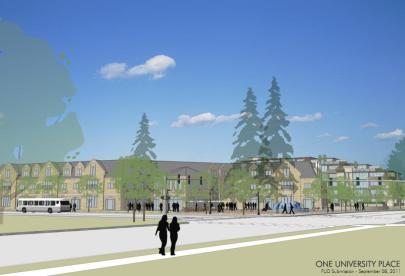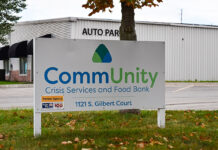
Discussion of One University Place project goes into the wee hours
By Gigi Wood
It was double secret probation time in University Heights last night as city councilors attempted to determine the financial validity of entering into tax incentive agreement with a developer.
One University Place is a proposed mixed-use condominium and commercial development planned for 1300 Melrose Ave., whereSt.Andrew Presbyterian Church is located. The lot is a few blocks west of Kinnick Stadium. If the development moves forward, it would be complete in 2016, with condos averaging $500,000 to $700,000.
It has been the subject of nearly every city council meeting – and election – for the past two years. The controversial project has split the town, with some opposing the project’s high density and others in favor of the potential increase in property tax value and revenue.
The project has progressed through many hurdles during the past two years, but hit a rough patch once again last night, during possibly one of the most important junctures in the development’s progress.
The draft of the tax increment financing agreement proposal, which was promised to councilors by last Friday, arrived to them last night. That means when councilors walked into the meeting, most had not reviewed the actual document. Approval of the agreement was an item on the council’s agenda.
Because the project is so controversial, the city council hired two financial firms to provide third-party assessments of the project’s financial validity, to determine how necessary the development’s potential future property value would be to the city’s budget.
On the council’s agenda was a financial analysis presentation by Tim Terry, founder of Terry, Lockridge & Dunn. He said he could not present an analysis of the development because the development team would not release its financial data.
“It’s like double secret probation,” Mr. Terry said, referencing the movie Animal House. “It brings us to a dead end in the evaluation of the development.”
Dennis Craven, the financial advisor for the development, said it was a professional standard in the accounting field to not release data to anyone not listed as a user in the development proposal. The only user listed is Jeff Maxwell, the developer.
Councilors and the audience questioned how the city could enter into a financial agreement with the developer based on financial conclusions but without reviewing the basis for those conclusions. John Danos, a TIF attorney fromDes Moineswho is advising the city on the agreement, wrote the proposed agreement with the development team. He said the city does not need to consider the financial calculations of the project as a risk, that the city’s obligation will not be met until the project is complete.
Mike Mesch of Terry, Lockridge & Dunn presented financial projection of the city budget 10 years into the future, based on the past 10 years of expenses, revenue and growth. The city will remain financial viable whether or not the development occurs, he said.
“There’s not a dire need for a large project that provides large sums of money to the city,” he said.
Johnson County Assessor Bill Greazel also made a presentation at the meeting. He was asked to speculate on the future property value of the development and its affect on surrounding properties in the area. He said the project is so unlike anything else in the county, he could not speculate.
“If you put up a condo in North Liberty, I could tell you what is going to happen; but with this, there is no template for it,” Mr. Greazel said. “I don’t know how many people want a $500,000 to $700,000 condo or what the appetite for commercial properties is in University Heights. There are a lot of vacancies in Coralville and the rest of the county.”
He did say that the project could have a negative impact on adjacent properties if the owners found the development unappealing. There is not much real estate activity in University Heights, except for homes converted into student rentals, he said and speculated that the condos would not likely compete with the single-family house market.
At the council’s August work session, councilors discussed the development for more than five hours. The development team agreed to add improvements to the Sunset Street intersection as part of the project and to participate in a financial analysis of the project by a third party. Without the intersection improvements, councilors who have supported the project said they would support a TIF for development. The TIF proposal presented last night left out the infrastructure improvements.
Last night’s meeting ended at about 1 a.m. A special formal meeting will be scheduled for a Tuesday night, either Sept. 27 or Oct. 4, to further discuss the TIF proposal.
Many residents in attendance asked for the council to defer a final decision about the TIF proposal until after the November election. At the Nov. 8 election,University Heights residents will vote to fill five councilor and the mayor positions.




